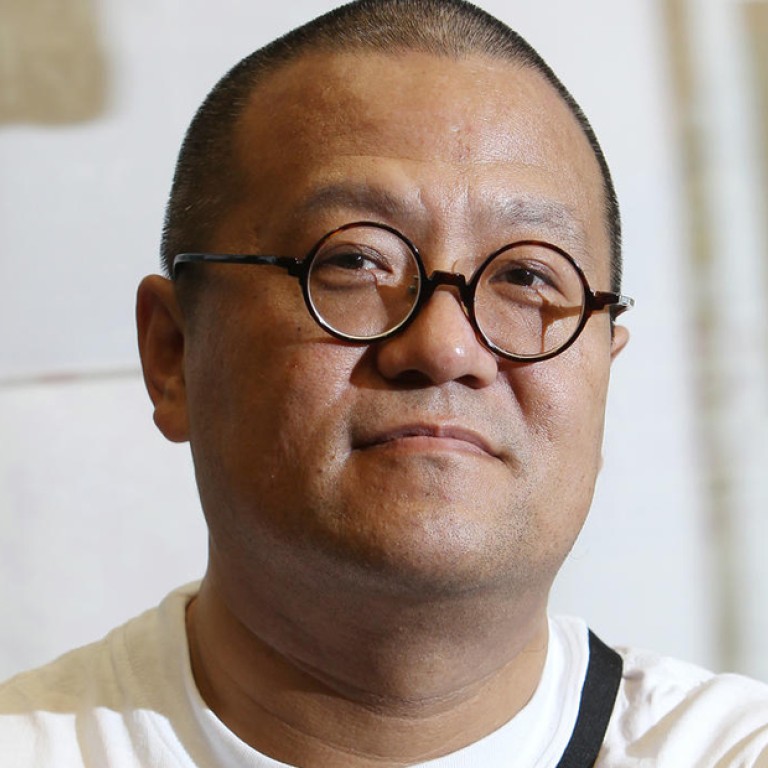
Dissident Yang Weidong's interviews give voice to silent history
Artist visits Hong Kong with his latest banned book, on the children of revolutionary heroes
Beijing-based artist Yang Weidong had to promise mainland officials he would not make any public speeches when he visited Hong Kong to promote the third volume of his collection of controversial interviews, called .
Yang, 47, is resigned to making such concessions in pursuit of his vision. "I have spent at least 7 million yuan (HK$8.8 million) on my project. I had to sell two of my apartments to support this project," he said during his recent visit.
All three volumes have been banned on the mainland and are published in Hong Kong by Fountain Head Press. The latest examines the lives of about three dozen children of revolutionary heroes - the so-called second-generation Revolutionary Red.
Among those Yang interviewed are Chen Gu , son of Chen Tanqiu , one of the founders of the Communist Party; Chen Xiaolu , son of famed civil war and Sino-Japanese war hero Marshal Chen Yi ; Dai Qing , daughter of revolutionary martyr Fu Daqing ; and Wu Qing, daughter of literary giant Bing Xin.
In the first and second volumes, Yang interviewed 30 leading thinkers and dissidents about their views on the government's Tiananmen crackdown, and on jailed Nobel Peace Prize winner Liu Xiaobo , among other sensitive topics.
The books are part of a larger ambition to produce a documentary based on his interviews with as many as 500 leading intellectuals on the mainland and in Taiwan and Hong Kong. Yang tries to record every interview with a camera, and has the subjects sign release forms.
Yang said he was greatly influenced by his parents, whom he said had suffered for speaking out.
His mother, Xue Yinxian , was a medical doctor for national sports teams. Yang said she resisted giving stimulants to athletes in the 1988 Olympics Games.
His younger brother graduated from China's top medical institute at Peking University in 1993, Yang said. But to this day he cannot get a licence. His father died not long after confronting officials about that matter in late 2007.
"My parents had petitioned higher authorities over my younger brother's case. On September 25, 2007, eight people from my mother's work unit went to my home and attacked my father," Yang said. At the time, his father was recovering from brain surgery, and he died two months later. The loss proved a turning point for Yang, and he swore to seek justice for his father. He quit his job and began work on the project.
He set up a production team of 24 people. "But all my employees were scared away by the authorities, so I work alone now."
About a dozen security and police officers monitor his activities around the clock, with one even moving into a flat above him. His home was searched and some interview tapes confiscated in 2011. To avoid another such loss, Yang sent the original video recordings of 200 interviews to the US for safe-keeping.
"I hate the Communist Party, but I don't hate the people the party sent to watch me because they also need to earn a living," Yang said. He tries to co-operate with them in exchange for a stable environment that allows him to continue his documentary work. "It's not worth it to debate with police officers over human rights when they are going to enter your home."
Last April, Yang was forced to tell plain-clothes officers he is a distant cousin of Vice-President Li Yuanchao after authorities barred him from taking a trip to Hong Kong. The party's central organisation department said Yang's claim about Li was false, but the artist insists it is true, and that authorities have since been amicable.
Yang said he had interviewed 345 people so far, and would now focus on meeting prominent thinkers and politicians in Hong Kong and Taiwan.
"I have found that both the media and the Chinese people expect a wise king to carry out reforms, instead of making an effort on their own to take responsibility for their future."
He pointed to his most recent interviews with the "red second generation". Many of them criticised the corruption in the political system and expressed hope the party would fix it. They fear that if the party collapses, the country will go the way of the Soviet Union.
"Almost all of them said they feared any big change, because that would harm their interests.
"People might think that pursuing such work makes me an idiot, but I do not regret what I have done," Yang said. "Keeping an account of what people think about our history and what we are facing is deeply important."

